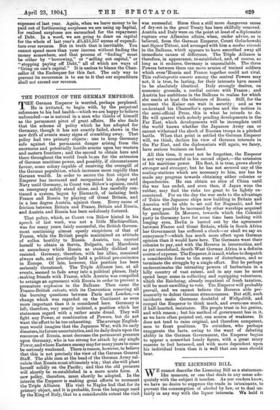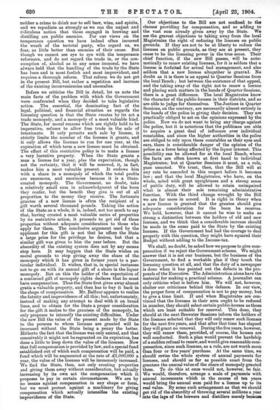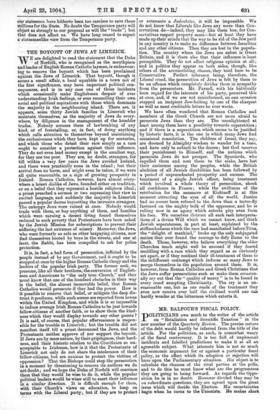neither a crime to drink nor to sell beer, wine,
and spirits, and we repudiate as strongly as we can the unjust and ridiculous notion that those engaged in brewing and distilling are public enemies. For our views on the temperance question we have indeed often incurred the wrath of the teetotal party, who regard us, we fear, as little better than enemies of their cause. But though we cannot see eye to eye with the temperance reformers, and do not regard the trade in, or the con- sumption of, alcohol as in any sense immoral, we have always held that the handling of the trade by the State has been and is moat foolish and most improvident, and requires a thorough reform. That reform we do not get in the present Bill, but rather a repetition and increase of the existing inconveniencies and anomalies.
Before we criticise the Bill in detail, let us note the main facts of the problem with which the Government were confronted when they decided to take legislative action. The essential, the dominating fact of the legal, political, and financial situation as regards the licensing question is that the State creates by its act a trade monopoly, and a monopoly of a most valuable kind. The State, for moral reasons which are rightly held to be imperative, refuses to allow free trade in the sale of intoxicants. It only permits such sale by license, it strictly limits tho number of the licenses it grants, and it only allows the licenses to run for one year, at the expiration of which term a new license must be obtained. The effect of this restrictive policy is to make a license a very lucrative property. When the State grants a man a license for a year, plus the expectation, though not the certainty, that it will be renewed, it, in fact, makes him a most valuable present. It endows him with a share in a monopoly of which the total profits are enormous, and enormous because it is a State- created monopoly. The Government, no doubt, take a relatively small sum in acknowledgment of the boon they confer, but the benefit they give is out of all proportion to the money they receive. The fortunate grantee of a new license is often the recipient of a gift worth several thousand pounds. Taking the action of the State as a whole, it is, indeed, not too much to say that, having created a moat valuable series of properties by its restrictive action, it proceeds to get rid of these properties without adequate consideration to those who apply for them. The conclusive argument used by the applicant for this gift is not that he offers the State a large price for the privilege he desires, but that a similar gift was given to him the year before. But the absurdity of the existing system does not by any means stop here. It may happen that the State wishes on moral grounds to stop giving away the share of the monopoly which it has given in former years to a par- ticular individual. It wishes, that is, in special instances not to go on with its annual gift of a share in the liquor monopoly. But on this the holder of the expectation of a continued gift of monopoly rights declares that he must have compensation. Thus the State first gives away almost gratis a valuable property, and then has to buy it back in the shape of compensation. Mr. Balfour appears to realise the fatuity and improvidence of all this ; but, unfortunately, instead of making any attempt to deal with it on broad lines, and to obtain for the State a proper consideration for the gift it makes to the grantees. of the monopoly, he only proposes to intensify the existing difficulties. Under the new Bill the value of the present made by the State to the persons to whom licenses are granted will be increased without the State being a penny the better. Hitherto the fast that the license was only annual, and that conceivably it might not be regranted on its expiration, has done a little to keep down the value of the licenses. Now that full compensation is provided by law, and a special fund established out of which such compensation will be paid, a fund which will be augmented at the rate of £1,000,000 a year, the value of the licenses will be immensely increased. We find the State, then, not only creating properties and giving them away without consideration, but actually increasing by its own act the compensation which it proposes to pay in certain circumstances. We are by no means against compensation in any shape or form, but we must protest against a machinery for giving compensation which actually intensifies the existing improvidence of the State. We shall, no doubt, be asked how we propose to give coin-, pensation if we reject the Government scheme. We might answer that it is not our business, but the business of the Government, to find a workable plan if they touch the licensing question at'all, and that the duty of a newspaper is done when it has pointed out the defects in the pro- posals of the Executive. The Administration alone have the material for making a practical scheme. A journalist can only criticise what is before him. We will not, however, shelter our criticisms behind this defence. In our view, the proper form of compensation is not to pay money, but to give a time limit. If and when Magistrates are con- vinced that the licenses in their area ought to be reduced in number, they should select certain public-houses as those which are least suitable for renewal. This done, they should at the next Brewster Sessions inform the holders of the licenses selected that they will only renew such licenses for the next five years, and that after that time has elapsed they will grant no renewaL During the five years, however, they will renew them, provided, of course, the houses are well conducted. Such a plan would prevent the hardship of a sudden refusal to renew, and would give reasonable com- pensation, since such licenses, as a rule, are not worth more than four or five years' purchase. At the same time, we should revise the whole system of annual payments for licenses, and should as far as possible exact from the grantees the annual value of the share of monopoly granted them. To do this at once would not, however, be fair. We would, therefore, arrange a scale of payments with annual increments which in the course of ten years would bring the annual sum paid for a license up to its real value. By some such arrangement as that we should get rid of the absurdity of throwing several millions a year into the laps of the brewers and distillers merely because our statesmen have hitherto been too careless to save those millions for the State. No doubt the Temperance party will object as strongly to our proposal as will the "trade"; but that does not affect us. We have long ceased to expect a statesmanlike view from the Temperance party.
THE BOYCOTT OF JEWS AT LIMERICK. -viTE are delighted to read the statement that the Duke












































 Previous page
Previous page